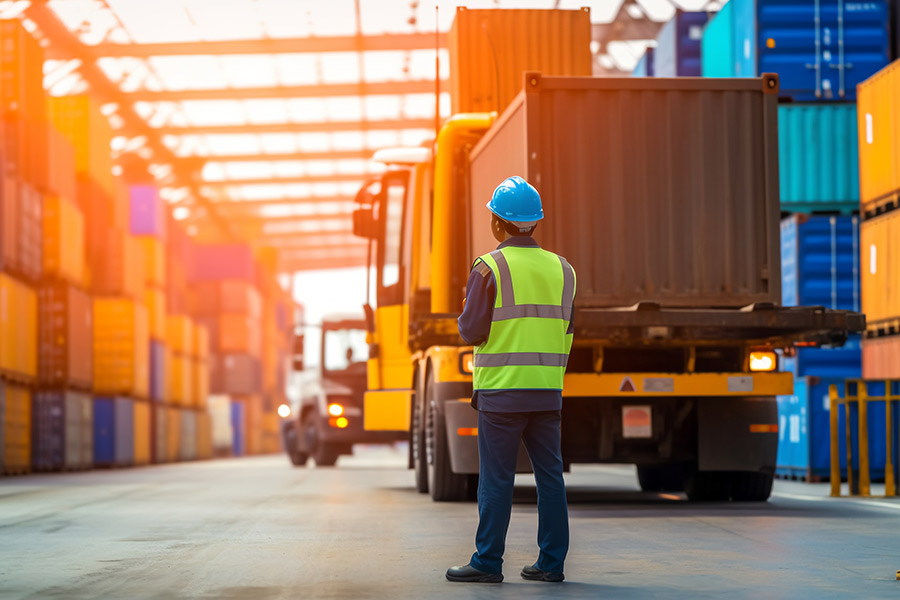

People who are new to international express logistics may be confused when they hear the "transit port", and think that the "transit port" should be the same as the domestic express "transit station", just for the convenience of the distribution of goods, in fact, this understanding is not completely correct, because the "transit port" of international dangerous goods shipping and the "transit station" of domestic logistics express are two different systems. Freight owners who have passed through shipping Logistics or entrusted international freight forwarders are more clear, this article let Sungreen Logistics take you to understand what the role of "transit port" in dangerous goods shipping is.
What is a transit port?
"Transit port" is also known as "transit port", refers to the goods from the port of origin to the port of destination, through the third port in the journey, the means of transport for docking, loading and unloading of goods, supply and other operations, the goods to continue to the port of destination, that is, the transit port. Here, the cargo may be transferred to another ship or other means of transport to continue its journey. There are both one-time transshipment by shipping companies and transshipment by shippers for duty-free reasons.

The role of transit port not only improves logistics efficiency, but also reduces transportation costs. It is more like a transportation hub, connecting goods from all over the world to form a huge logistics network. Through the transit port, goods can reach their destination more quickly and safely, meeting the needs of different customers in the market.
What are the types of transit ports?
1. Basic port transfer
This type of transit port is usually a large port on the main international shipping route, which can handle a large number of cargo transfer business. The vessels that call at these transit ports are often large international maritime vessels, where cargoes are loaded, unloaded and transferred.
2. Feeder port transfer
Feeder port transshipment is more to serve the transport of goods within the region. These ports are usually small in size, but are ideally located to facilitate the transit and distribution of goods within the region.
3. Free trade port transfer
Some transit ports are designated as free trade ports, such as Hong Kong. These ports have special tax and trade policies, and goods transiting here can enjoy tax exemptions or tax rebates. This is of great significance for reducing transportation costs and improving the competitiveness of goods.
What are the common transit ports in international shipping?
Sungreen Logistics has compiled some common transit ports: London, Victoria, Hong Kong, Alexandria, Singapore, Hamburg, Rotterdam, Varna, Bremen, Salvador, Yangon, Vancouver, Montreal, Maersk, SAN Antonio, Shanghai, Quanzhou, Lianyungang, Whampoa, Qingdao, Cologne, Suez, Sydney, Liverpool, Toronto, Manchester, Gibraltar, Guam, Rio de Janeiro, etc.

What is the difference between transit, docking and docking?
Many people are easy to confuse the concept of transit, docking, and docking, here to make a distinction for everyone, transit is not equivalent to stopping or docking. In the transit port or transit area, the transport vehicle needs to unload the original goods and load the new transport vehicle for the next journey of transport, which is called transit. Although the stopover is also a stopover, the goods will not be unloaded from the transport vehicle, and the next transport will also use the same transport vehicle. Calling means calling at a port on the way.
What is the purpose of the transit port?
As mentioned above, many people think that the purpose of "transit port" is to facilitate the distribution of goods, in fact, it is not, the purpose of "transit port" in maritime transport is to achieve duty free and hold goods.
1. Tax exemption
Tax exemption is a common advantage of transit ports. If the goods go through a transit port designated as a free trade port, you can enjoy the benefits of reduced tariffs. Taking Hong Kong as an example, as a free trade port, goods transiting through Hong Kong can generally achieve the purpose of duty-free export. You may even be eligible for tax rebates and grants. This is the amazing advantage of staging, making your deals more cost-effective.
2.hold the goods
HOLD cargo is a common term in the field of international trade and logistics, which refers to the state in which goods are temporarily held in a customs notice. This status usually indicates that the goods require further review, inspection or treatment to determine whether they comply with import or export requirements and regulations. For example, when the goods are unable to proceed halfway, the consignor can apply to the shipping company to stay temporarily before arriving at the port of transit. The goods will be reshipped to the port of destination after the settlement of the trade problem.

What should I pay attention to in transit?
Choosing the right port of transit is crucial when operating the international maritime transport of goods. A ship will be attached to a number of ports, so the ship in the same port to record the port code, that is, the subsequent transit port code there are many, if the delivery is free to fill in the code, the match will cause the container can not enter the port.
1. Fill in the transit port code accurately
Be sure to fill in the transit port code accurately when booking. The wrong code may cause the cargo to be unable to enter the port smoothly or to be discharged to the wrong port, causing unnecessary losses and delays.
2. Understand the shipping company's transit policy
Different shipping companies have different regulations on the selection and operation of transit ports. When choosing a shipping company and booking space, it is necessary to understand and comply with these regulations to avoid unnecessary trouble.
3. Consider shipping costs and time
Intermediate transfers increase the time and cost of transporting goods. When choosing whether to transfer and which transit port to choose, it is necessary to consider these factors comprehensively and weigh the advantages and disadvantages.
4. Pay attention to the particularity of the goods
For special goods such as dangerous goods, transit operations need to be more careful. In the selection of transit ports and shipping companies, it is necessary to pay special attention to whether they have the qualifications and capabilities to handle such goods, especially with dangerous package certificates and commodity inspection certificates.

SHANGHAI SUNGREEN LOGISTICS GROUP CO.,LTD., deeply engaged in the international logistics and transportation industry of dangerous goods, Provide dangerous goods sea FCL, dangerous goods air freight, dangerous goods import, ISO TANK transportation, dangerous goods gate trailer, dangerous goods storage, maritime and port records, GHS label and UN packaging rectification, acting for dangerous bag certificate commodity inspection performance classification and identification, overseas customs clearance delivery, dangerous goods declaration, customs clearance, ocean booking, consulting and training and other one-stop whole process dangerous goods logistics international freight forwarding services.





